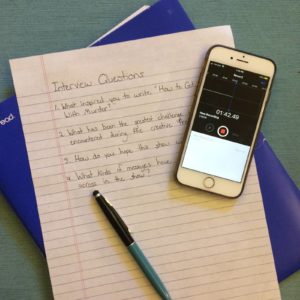
As students, we hear a lot about preparing for interviews, especially when it comes to answering questions about ourselves. But what about conducting our own interviews? For my thesis, I will be traveling soon to interview film producers about their work, and I have been wondering what I should do in order to prepare. More specifically, how do I get the most out of an interview that will be used for research? After looking up pointers and consulting with my adviser, I’ve compiled some helpful tips on how to be an interviewer:
Preparing for the Interview
When it comes to getting ready for an interview, there’s more to consider than just which questions to ask. For example, the location of your interview can impact your productivity. Taking the time to pick out a space where there are minimal distractions can make your interviewee feel more comfortable and allow them to focus more deeply on their responses. It can also be helpful to meet an interviewee at their place of work where they may feel more comfortable opening up.
Another factor to consider is how you’ll take down information. While writing notes is useful, it can sometimes distract the interviewee or take too long to keep up with responses. As a result, a helpful alternative would be to audio record the interview, a method that doesn’t require you to rely on your memory and will allow you to pay full attention to your subject.
Conducting the Interview
At the beginning of an interview, it’s important to go through a few protocols. Although you may have already explained your topic when requesting the interview, it’s helpful to reiterate the purpose of your work and how the interviewee’s responses will be incorporated into it. There’s also the matter of confidentiality. Since the interview may involve revealing personal information, it’s crucial that the interviewee sign a consent form, and be informed of who will have access to their responses and whether or not they can remain anonymous.
While interviewing your subject, keeping questions as neutral as possible will help them feel more comfortable expressing their viewpoints; any wording that sounds leading or judgemental may influence their answers and impact your study. For example, a question such as, “Do you actively avoid stereotypes in your television show?” can be rephrased as, “What qualities do you aim to emphasize in your characters?” Likewise, showing strong emotional reactions to an interviewee’s answers could lead them to say what they think you want to hear. Instead, you can stay engaged by giving an occasional nod and inserting an “uh-huh” every now and then to let them know that you’re invested in hearing their true thoughts.
Closing the Interview
Once you’ve asked all your questions, it can be helpful to ask your interviewee if they’d like to share any additional information. Sometimes, there might have been something they wanted to elaborate on or a point you hadn’t asked about that they’d like to address. You can also use this opportunity to inquire about scheduling a follow-up interview or getting in touch with others who may be open to answering your questions. When all is said and done, it’s nice to send a formal thank you to your interviewee later on, and perhaps even to share your research with them once it’s finished.
—
While being an interviewer may feel like unfamiliar territory, taking the time to prepare can help you feel more relaxed and enable you to make the most of the experience. If you’re worried about what topics to cover or how your questions should be worded, you can consult with your adviser for a second opinion. It’s also important to keep in mind that any research with human subjects must receive IRB approval beforehand. Aside from these factors, conducting an interview is like having an open conversation in which both participants get the chance to enjoy and learn from the experience.
— Taylor Griffith, Social Sciences Correspondent

